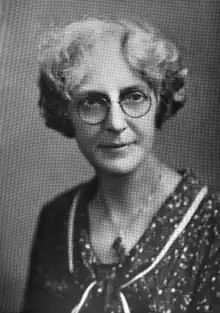Sarah E. Dickson
Sarah Ellen Dickson (August 31, 1880 – November 21, 1965) was the first woman elder in the Presbyterian Church in 1930.[1][2] She was a "pioneer in the daily vacation bible school movement,"[3] She was active in church work for over 60 years and was known as "the chief".[3]
Sarah Ellen Dickson | |
|---|---|
 | |
| Born | August 31, 1880 |
| Died | November 21, 1965 (aged 85) |
| Occupation | Presbyterian church elder |
| Years active | 1904-1965 |
Biography
She was born in 1880 in Elwood, Illinois, a small suburb of Chicago.[4] She was the daughter of John Richard Dickson and Grace Ellwood Dickson, her father was a merchant.[4] Her parents both died while she was a child, and she was taken in by her grandparents at age fifteen.[4] She was educated in the Chicago Public Schools.[4]
She became active in church work. She was appointed secretary of Second Presbyterian Church in 1904,[4] and organized and was first president of the Young Women's Presbyterian Union.[4]
In 1906 she became secretary, treasurer and editor of the Federated Religious Press.[4] In 1911 and 1912, as executive secretary of the Layman's Evangelistic Council she directed evangelistic campaigns across the country including for Billy Sunday, John Wilbur Chapman, and others.[4]
In the early 1920s, Dickson took under her wing a "motherless boy" named Richard E. Evans, and effectively (but not legally) became his foster mother. She guided his religious education and encouraged him to become a minister.[5]
In 1924 she moved to Edgewater Presbyterian Church and in 1925 was appointed one of the first deaconesses in Chicago, at that time the highest position a woman could hold in the church.[4]
In the fall of 1927, while still a seminary student, Evans preached at the newly established Presbyterian church in Wauwatosa, Wisconsin and made a strong impression. After just a few Sundays preaching, the congregation asked Evans to be their pastor.[6] Dickson moved to Wauwatosa as well and became director of religious education at the church.[4]
Presbyterians had considered, but rejected, women as elders in 1920[6] and again in 1929.[2] At the 1930 General Assembly in Cincinnati, the idea was approved by a vote of 158-118[2] on May 31, 1930.[6] Pastor Richard Evans was present as an observer, and telephoned home to set up a congregational meeting upon his return.[7] At that meeting on June 2, 1930,[2] Dickson was unanimously elected an elder of the Wauwatosa church.[4][7] One member remarked that this happened because "she deserved it."[7]
Evans left Wauwatosa in 1933, and Dickson moved with him to another church.[7] The pair moved to Florida in 1937 to work with a publishing company.[7]
Dickson was active in her career in promoting interfaith activities.[3] During the 1950s she travelled to the Holy Land four times, each time in a wheelchair.[3]
Dickson moved to New York City in 1960 and was an elder at the Church of the Crossroads on 14th Street.[3] She died at St. Barnabas Hospital on November 21, 1965.[3]
A Presbyterian retirement home in Menomonee Falls, Wisconsin is named Dickson Hollow in honor of Sarah Dickson.[8]
See also
References
- Krugler & Weinberg-Kinsey 1990, p. 245.
- "Sarah Dickson Becomes First Female Presbyterian Elder". Association of Religion Data Archives. Archived from the original on January 14, 2020. Retrieved August 27, 2020.
- "Miss Sarah E. Dickson, 89, First To Hold Church Office". The New York Times. November 23, 1965. p. 45.
- Downs, Winfield Scott, ed. (1936). Encyclopedia of American Biography: New Series. Vol. 6. American Historical Society. pp. 202–203. OCLC 649569887 – via HathiTrust.
- Krugler & Weinberg-Kinsey 1990, p. 246.
- Krugler & Weinberg-Kinsey 1990, p. 247.
- Krugler & Weinberg-Kinsey 1990, p. 248.
- "On International Women's Day: remembering women of honor at PHS". Presbyterian Homes & Services. March 8, 2019. Archived from the original on February 26, 2021.
Further reading
- Krugler, John D.; Weinberg-Kinsey, David (Winter 1990). "Equality Of Leadership: The Ordinations of Sarah E. Dickson and Margaret E. Towner in the Presbyterian Church in the U.S.A.". American Presbyterians. Presbyterian Historical Society. 68 (4): 245–257. JSTOR 23333078.